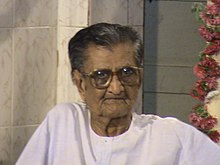
Dayanand Saraswati, was a Hindu philosopher, social leader and founder of the Arya Samaj, a reform movement of Hinduism. His book Satyarth Prakash has remained one of the influential text on the philosophy of the Vedas and clarifications of various ideas and duties of human beings. He was the first to give the call for Swaraj as "India for Indians" in 1876, a call later taken up by Lokmanya Tilak. Denouncing the idolatry and ritualistic worship, he worked towards reviving Vedic ideologies. Subsequently, the philosopher and President of India, S. Radhakrishnan, called him one of the "makers of Modern India", as did Sri Aurobindo.
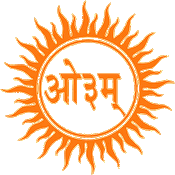
Arya Samaj is a monotheistic Indian Hindu reform movement that promotes values and practices based on the belief in the infallible authority of the Vedas. The samaj was founded by the sannyasi (ascetic) Dayanand Saraswati in the 1870s.

A gurukul or gurukulam is a type of education system in ancient India with shishya living near or with the guru in the same house for a period of time where they learn and get educated by their guru. Tradition by contrast, the word Guru has a very restricted use and not generally applied to individual teachers, while the institution of Gurdwara has a major social role instead of a monastic one.) The word gurukula is a combination of the Sanskrit words guru and kula. The term is also used today to refer to residential monasteries or schools operated by modern gurus. The proper plural of the term is gurukulam, though gurukuls is also used in English and some other European languages.

The Arya Samaj was the first religious, cultural and educational Fiji Indian organisation established in Fiji. From its inception, in 1904, it attracted the young, educated and progressive Hindus into its fold. During the first three decades of the twentieth century, it was the sole voice of the Indian community in Fiji and as Fiji Indians won political rights, it was not surprising that first Indian members of the Legislative Council were all Arya Samajis. The influence of Arya Samaj over the Indians in Fiji gradually waned as other organisations representing Indians were established but it remained the dominant force in politics until 1959. The modern day Arya Samaj in Fiji still speaks out on issues affecting its members and its activities are visible through the numerous educational institutions that it manages.
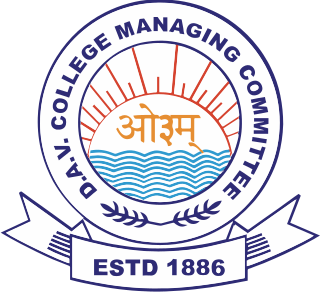
The D.A.V. College Managing Committee, familiarly known as DAVCMC, is a non-governmental educational organisation in India and overseas with over 900 schools, 75 colleges and a university. It is based on the ideals of Dayananda Saraswati and Arya Samaj. The Dayanand Anglo-Vedic (DAV) education system also comprises colleges offering graduates and post-graduates degrees in areas of study all over India.

Gurukula Kangri is a Government-funded Deemed to be University u/s 3 of the UGC Act 1956 located in Haridwar, Uttarakhand, India. It is fully funded by UGC/ Govt. of India. It is NAAC "B" grade accredited. Situated near the bank of the Ganges, Haridwar and about 200 km from New Delhi. Gurukula Kangri has 25 academic departments covering Engineering, Applied Sciences, Vedic Sciences, Humanities and Social Sciences and Management programs with a strong emphasis on Vedic and Modern Sciences and technological education and research. The university has signed about 34 memorandums of understanding with industries, universities, NGOs, and institutions.

Suriname has possibly the highest proportion of Hindus who are Arya Samajis, compared to any other country. In Suriname, the Hindu population had split, with roughly 20% following the teachings of Swami Dayanand Saraswati, founder of the Ārya Samāj, and 80% following the Sanatan Dharm. According to the census of 2012 the number of Ārya Samājĩs is 16,661. The arrival of Arya Samaj preachers in Suriname, in 1929, caused a rift in the Hindu community, between the followers of Sanātanī and the Ārya Samāj.

Arya Samaj is a Hindu reform movement in South Africa. Like other parts of the world where people of Indian origin are settled, the teachings of Swami Dayananda Saraswati, founder of the Arya Samaj, made their way to South Africa during the beginning of the twentieth century. The Arya Samaj encouraged Indian South Africans to take pride in their heritage and culture and promoted education and social reform.

Arya Samaj is a Hindu reform movement in Mauritius. Established in 1911, the Arya Paropkarini Sabha was officially registered in 1913. Since its creation Arya Samaj has had a great influence on the religious, social, educational and political lives of the people of Indian origin on the island. It has endeavoured to uphold the principles and ideals set forth by Maharishi Dayanand and his reformist movement. Some of the more notable ideals are women parity and free access to education. It has provided Hindus with a choice of progressive Hinduism, has promoted education with particular emphasis on Hindi and established orphanages, primary schools, colleges and tertiary institution.

Satyarth Prakash is an 1875 book written originally in Hindi by Dayanand Saraswati, a religious and social reformer and the founder of Arya Samaj. The book was subsequently revised by Swami Dayanand Saraswati in 1882 and has been translated into more than 20 languages including Sanskrit and foreign languages, including English, French, German, Swahili, Arabic and Chinese. The major portion of the book is dedicated to laying down the reformist advocacy of Swami Dayanand with the last four chapters making a case for comparative study of different religious faiths.
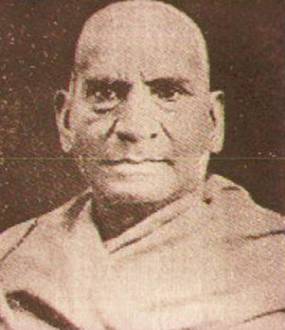
Swami Shraddhanand, also known as Mahatma Munshi Ram Vij, was an Arya Samaj sannyasi and an Indian Independence activist who propagated the teachings of Dayananda Saraswati. This included the establishment of educational institutions, like the Gurukul Kangri University, and played a key role on the Sangathan and the Shuddhi (purification), a Hindu reform movement in the 1920s.
Adi Dharm refers to the religion of Adi Brahmo Samaj the first development of Brahmoism and includes those Sadharan Brahmo Samajists who were reintegrated into Brahmoism after the second schism of 1878 at the instance of Devendranath Tagore. This was the first organised casteless movement in British India and reverberated from its heart of Bengal to Assam, Bombay State, Punjab and Madras, Hyderabad, and Bangalore.
Dayanand College is a college in Ajmer, Rajasthan, India, that was established in 1887 in form of a Pathshala (School) through the efforts of Karmaveer Pt. Jiyalal and Prof. Dattatreya Vable. In July 1942, it became a college. After Dayanana Anglo-Vedic College (DAV) in Lahore was closed, this college became the oldest Dayanand College run by Arya Samaj Shiksha Sabha. Dayanand College is affiliated with Maharshi Dayanand Saraswati University, Ajmer.
Pundit Ganga Prasad Upadhyaya (1871-1968) was an Arya Samaji writer. He served as professor of Meerut College at Allahabad University and as chief judge at Tehri, Garhwal District, from which post he retired to serve the Arya Samaj full-time. He was the father of Swami Satya Prakash Saraswati, another notable Arya Samaji author and Vishwa Prakash, Shree Prakash and Ravi Prakash.
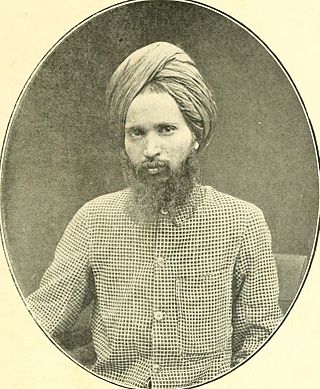
Lala Hansraj also known as Mahatama Hansraj, was an Indian educationist and a follower of Arya Samaj movement founder, Swami Dayanand. He founded, with Gurudatta Vidhyarthi, the Dayanand Anglo-Vedic Schools System (D.A.V.) in Lahore on 1 June 1886, where the first D.A.V. school was set up in memory of Dayanand who had died three years earlier.
Nanji Kalidas Mehta, MBE was an Indian industrialist and philanthropist from Gujarat. He found the Mehta Group in British East Africa, with its head office in India. Known as Sheth Nanjibhai. His son Mahendra Mehta, daughter in-law Sunayana Mehta and grandson Jay Mehta now own the Mehta Group
Shripad Damodar Satwalekar was a polymath with interests in painting, social health, Ayurveda, Yoga, and Vedic literature. He was also the founder of the Swadhyay Mandal - A Vedic Research Institute.

Pandit Lekh Ram was a 19th-century social reformer, publicist, and writer from Punjab, India. He was the leader of the radical wing within the Arya Samaj, an Indian Hindu reform movement. He was known for his criticism of the caste system, superstitions, and blind faith prevalent in Hindu society. He also advocated for the education and empowerment of women. He is also known particularly for his encounters with Mirza Ghulam Ahmad, the founder of the Ahmadiyya movement, and as a subject of his death prophecy. Lekh Ram's outspoken views and writings made him a controversial figure, and he faced opposition and violence from conservative Hindus and Muslims. His assassination by an unidentified assailant on 6 March 1897 is believed by Ahmadi Muslims to have occurred in accordance with Ahmad's prophecy concerning him.
Chhalesar is a village in the block and nagar panchayat of Jawan Sikandarpur, Aligarh district in Northern India. It is also known for being the location of the fourth Vedic school ("gurukul") founded in 1870 by the Arya Samaj reform movement. Swami Dayanand also visited here with Thakur Bopal Singh and Thakur Manna Singh.
Ishwardatt Medharthi (1900-1971) was an Indian religious leader, anti-caste social reformer, and independence activist. Born in a low-caste Arya Samaji family, he attended the Gurukul Kangri school for 14 years. He served time in prison for participating in the Bardoli Satyagraha (1929) and the Salt March (1930). After being released from prison, he ran a school in Kanpur and wrote books criticizing the caste-based discrimination. He turned to Buddhism in the 1930s, and taught Pali language to the Dalit leader B. R. Ambedkar in the 1940s. Later, he came under the influence of the Baháʼí Faith, and returned to the Arya Samaj during his last years.
